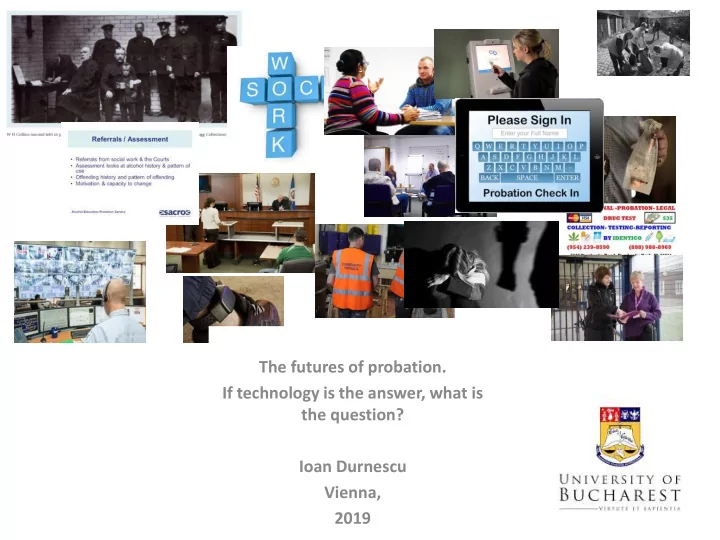

The futures of probation. If technology is the answer, what is the question? Ioan Durnescu Vienna, 2019
• Many meanings and levels of definition: – ‘the application of scientific knowledge for practical purposes’ – ‘The machinery and equipment What is based on the scientific knowledge’ – ‘the branch of knowledge dealing technology? with engineering or applied sciences’ – From Greek - ‘systematic treatment’ *dictionary.com
‘Save the souls’ – end of XIX th Century – • ‘man of God’ • ‘Sentenced to social work’ – after the WW2 • Years of pessimism – 70s-80s – ‘Nothing works’ – help in the client’s terms Short history • What works – 90s • of Strengths based approaches – after 2000 rehabilitation Some of these developments were very aptly described and explained by McWilliams (1983, 1985) – how the religious fundament was replaced with the ‘scientific’ social work diagnostic by taking a more deterministic approach to alcohol consumption.
• Ever since science started to play a more prevalent role – beginning of the 20th Century – diagnostic, treatment etc. based on social casework or Technology psychodynamic theories • Community service, attendance in centres, drug addiction centres etc. rehabilitation • Electronic monitoring 6 distinctive • Victim / Offender Mediation / RJ waves • What Works – risk assessment, programs etc. • Desistance – relationship work, social capital
• Manualized programs – e.g. ’offending behaviour’ • Digitally assisted programs – TimeWise – E&W – 14 steps, reducing violence, animates • Apps – Europe: Northern Ireland, Sweden and Netherlands Technology • Smart databases – for registration but also for sentence planning, scheduling, as programs supervision, correspondence etc. (Neustart – DOKU; Client system-KVR in – soft- Sweden) • Games technologies • Computer software to monitor the computer activities of the probationers • Use of Skype for communication with remote areas. • Artificial Intelligence and big data • Facebook and Tweeter
Probation Apps - supervision by smarphone • Pasive: – providing information – e.g. Changing Lives (NI) – monitoring compliance – Telenav (Indiana)-observing compliance with home detention and drug treatment • Interactive • Neighborhood Opportunity Networks (NoONs)- NY – encourage positive behavior – points system for community goals, customizable. • Allows direct communication with POs and other service providers. • Integrated – PO Smartphone App (North Carolina) – case management integrated with the monitoring of offenders – supervising POs?
• Artificial intelligence (machine learning): – Machine that learn, reason and self-correct – ‘Self - aware’ – to be developed • AI Risk - based on past events – amplify discrimination based on race, ethnicity or socio- economic status • Self-aware – ‘game changer’ - more preventive actions – anticipating and blocking the act
• Electronic monitoring – 1983 (Jack Love) – For small number on house arrest – Passive, active and GPS technology – ‘dirty technology’ - Electronic Technology as monitoring with Conducted Energy Devices (CED) (Nellis, equipment / 2018) machine • Alcohol monitoring: – Ignition interlock device – - hard- measures blood alcohol content (BAC) technology - – Continuous transdermal alcohol monitoring – reading from the probationer’s perspiration – alcoholmeter (NL) – Breathalyzer
• Numerous advantages: e.g. less traveling, higher flexibility, more Conclusions accuracy, more consistency across the service, improve digital skills, prolong - advantages the constructive influence of PO beyond the office, more fun, cheaper, faster etc. (after Kip et al, 2018)
• Limits of the existing technologies – see risk assessment accuracy levels • Faulty technologies – no connections • Tighter control – more breach? Conclusions • Hard technologies in time – passive – interactive – pro-active (preventing - limits - undesirable behaviours) • Ethical issues around the use of the pro-active tech and AI
• Technology and information shape the practice in many subtle ways – see the actor-network theory (Brown, 2006; Philips, 2017) • What are the ramifications of the use of technology ? • How can we use technology to enable Questions: and support compliance and not to promote breach? • What are the ethical implications for each technology and how to deal with them? • How can we keep the humans in the ‘centre of the universe’?
Technology is not good, or bad, or … neutral. It only exist!! Thank you !! Ioan Durnescu idurnescu@gmail.com
Recommend
More recommend